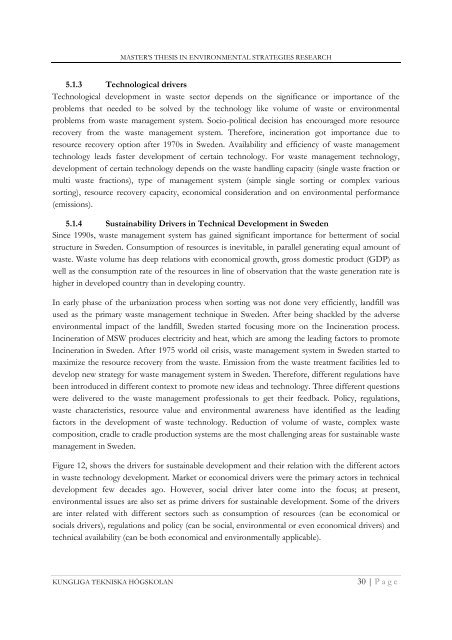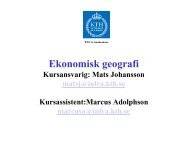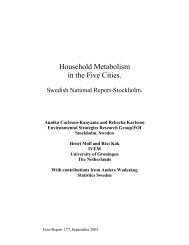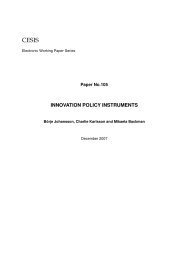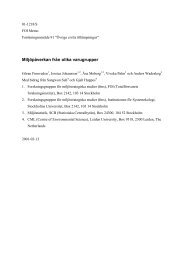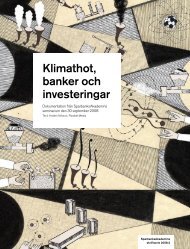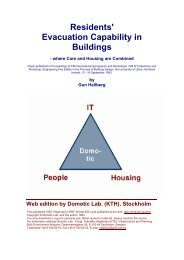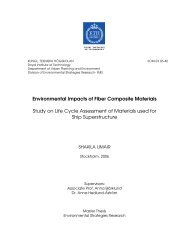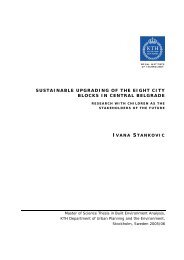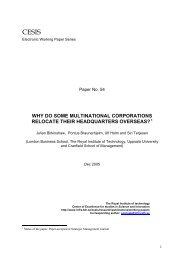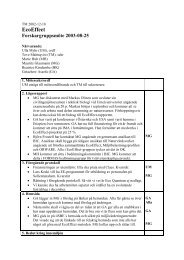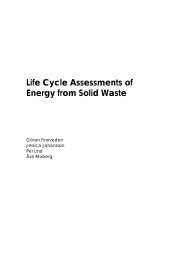Technical Development of Waste Sector in Sweden: Survey
Technical Development of Waste Sector in Sweden: Survey
Technical Development of Waste Sector in Sweden: Survey
You also want an ePaper? Increase the reach of your titles
YUMPU automatically turns print PDFs into web optimized ePapers that Google loves.
MASTER’S THESIS IN ENVIRONMENTAL STRATEGIES RESEARCH<br />
5.1.3 Technological drivers<br />
Technological development <strong>in</strong> waste sector depends on the significance or importance <strong>of</strong> the<br />
problems that needed to be solved by the technology like volume <strong>of</strong> waste or environmental<br />
problems from waste management system. Socio-political decision has encouraged more resource<br />
recovery from the waste management system. Therefore, <strong>in</strong>c<strong>in</strong>eration got importance due to<br />
resource recovery option after 1970s <strong>in</strong> <strong>Sweden</strong>. Availability and efficiency <strong>of</strong> waste management<br />
technology leads faster development <strong>of</strong> certa<strong>in</strong> technology. For waste management technology,<br />
development <strong>of</strong> certa<strong>in</strong> technology depends on the waste handl<strong>in</strong>g capacity (s<strong>in</strong>gle waste fraction or<br />
multi waste fractions), type <strong>of</strong> management system (simple s<strong>in</strong>gle sort<strong>in</strong>g or complex various<br />
sort<strong>in</strong>g), resource recovery capacity, economical consideration and on environmental performance<br />
(emissions).<br />
5.1.4 Susta<strong>in</strong>ability Drivers <strong>in</strong> <strong>Technical</strong> <strong>Development</strong> <strong>in</strong> <strong>Sweden</strong><br />
S<strong>in</strong>ce 1990s, waste management system has ga<strong>in</strong>ed significant importance for betterment <strong>of</strong> social<br />
structure <strong>in</strong> <strong>Sweden</strong>. Consumption <strong>of</strong> resources is <strong>in</strong>evitable, <strong>in</strong> parallel generat<strong>in</strong>g equal amount <strong>of</strong><br />
waste. <strong>Waste</strong> volume has deep relations with economical growth, gross domestic product (GDP) as<br />
well as the consumption rate <strong>of</strong> the resources <strong>in</strong> l<strong>in</strong>e <strong>of</strong> observation that the waste generation rate is<br />
higher <strong>in</strong> developed country than <strong>in</strong> develop<strong>in</strong>g country.<br />
In early phase <strong>of</strong> the urbanization process when sort<strong>in</strong>g was not done very efficiently, landfill was<br />
used as the primary waste management technique <strong>in</strong> <strong>Sweden</strong>. After be<strong>in</strong>g shackled by the adverse<br />
environmental impact <strong>of</strong> the landfill, <strong>Sweden</strong> started focus<strong>in</strong>g more on the Inc<strong>in</strong>eration process.<br />
Inc<strong>in</strong>eration <strong>of</strong> MSW produces electricity and heat, which are among the lead<strong>in</strong>g factors to promote<br />
Inc<strong>in</strong>eration <strong>in</strong> <strong>Sweden</strong>. After 1975 world oil crisis, waste management system <strong>in</strong> <strong>Sweden</strong> started to<br />
maximize the resource recovery from the waste. Emission from the waste treatment facilities led to<br />
develop new strategy for waste management system <strong>in</strong> <strong>Sweden</strong>. Therefore, different regulations have<br />
been <strong>in</strong>troduced <strong>in</strong> different context to promote new ideas and technology. Three different questions<br />
were delivered to the waste management pr<strong>of</strong>essionals to get their feedback. Policy, regulations,<br />
waste characteristics, resource value and environmental awareness have identified as the lead<strong>in</strong>g<br />
factors <strong>in</strong> the development <strong>of</strong> waste technology. Reduction <strong>of</strong> volume <strong>of</strong> waste, complex waste<br />
composition, cradle to cradle production systems are the most challeng<strong>in</strong>g areas for susta<strong>in</strong>able waste<br />
management <strong>in</strong> <strong>Sweden</strong>.<br />
Figure 12, shows the drivers for susta<strong>in</strong>able development and their relation with the different actors<br />
<strong>in</strong> waste technology development. Market or economical drivers were the primary actors <strong>in</strong> technical<br />
development few decades ago. However, social driver later come <strong>in</strong>to the focus; at present,<br />
environmental issues are also set as prime drivers for susta<strong>in</strong>able development. Some <strong>of</strong> the drivers<br />
are <strong>in</strong>ter related with different sectors such as consumption <strong>of</strong> resources (can be economical or<br />
socials drivers), regulations and policy (can be social, environmental or even economical drivers) and<br />
technical availability (can be both economical and environmentally applicable).<br />
KUNGLIGA TEKNISKA HÖGSKOLAN<br />
30 | Page


